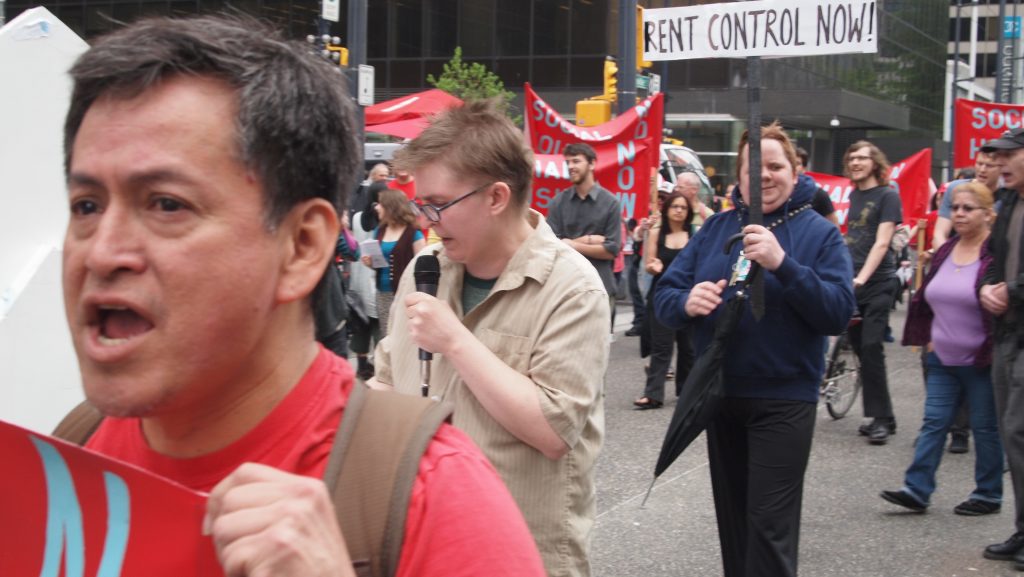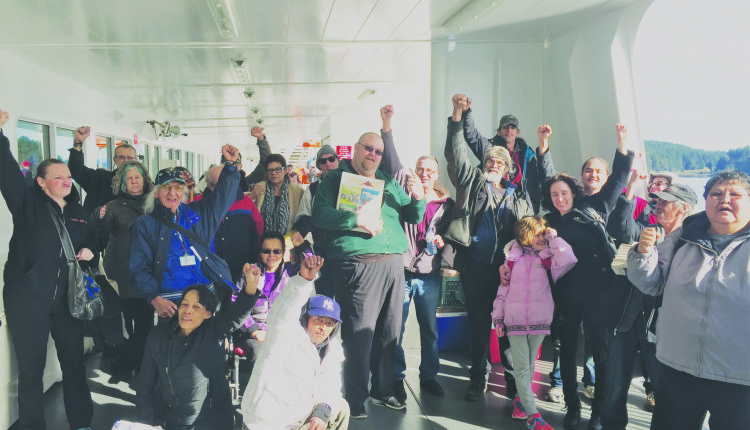

On May 1st, 2018 Alliance Against Displacement (AAD) signed a lease together with Migrant Worker’s Dignity Association (MWDA) for a large office and meeting space in Surrey. The space, a former grocery store, is located on 10679 King George Avenue near the Gateway Skytrain Station in Whalley, on the occupied Coast Salish Territories of the the Kwantlen, Katzie, Qayqayt, Kwikwetlem, Tsawwassen, Semiahmoo, Sto:lo and Tsleil-Waututh Nations.
AAD’s new office in Surrey symbolizes a significant shift in the geography of political organizing in BC. Only a couple of years ago, organized housing and homelessness campaigns outside of the Downtown Eastside (DTES) seemed hard to imagine, but there are now organized tent cities and anti-eviction, anti-police brutality, urban Indigenous and women’s anti-violence campaigns in towns and cities throughout the province. Not only do these struggles exist, but they are organized, militant, and those involved in them are actively supporting each other.
The shift to a more regional and connected anti-displacement and community power movement didn’t happen overnight. Rather, it comes as the culmination of years of AAD’s organizing strategy to push beyond the confines of East Vancouver and to create a broader movement connecting struggles across the region.
Going Beyond the DTES: 2013-2014
When I started organizing with what is now AAD, we were called the Social Housing Coalition (SHC). Catering to the political landscape of BC’s 2013 provincial election, the central demand of the SHC was for the government to build 10,000 units of social housing across BC every year. This province-wide demand was part of a strategy to widen the scope of housing organizing beyond the DTES.
The DTES was home to the most visible and concentrated symptoms of the housing crisis, and decades of housing activism focused exclusively on the area reinscribed the myth that if we solved the housing crisis in the DTES, we could solve the crisis everywhere. While originating from DTES housing groups and struggles, SHC’s claim was the opposite of the historical norm – we said that if we solved the housing crisis everywhere, it would also be solved in the DTES.
Leading up to the election, SHC organized flying squads, stands for social housing, petitions and protests across the province. Despite our efforts, SHC barely made a dent in the election agenda. Instead, the focus on electoral reform kept SHC removed from communities in struggle and the campaign failed to build organizing capacity and resistance beyond Vancouver. After the election we held many meetings in communities to decide what to do next.
It became clear that organizing for social housing did not resonate with people who were deepest in housing crisis. Many people who were homeless had terrible experiences with poorly maintained and institutionally managed social housing and others who were facing eviction were repelled by the stigma attached to social housing. Rather than a dignified alternative to market housing, social housing – particularly its newest incarnation created by the BC Liberals and now embraced by the BC NDP, supportive housing – had become defined by intense social control, regulation, surveillance and punishment.
Moreover we felt increasingly sceptical of the role of welfare-based demands in building an anti-capitalist and anti-colonial social movement. Demands for social housing on unceded territories often comes at the cost and trade off of Indigenous sovereignty; demands to return to the welfare state call for wealth stolen from Indigenous peoples to be more equitably distributed amongst settlers. In this way we felt that our singular focus on social housing also compromised our ability to understand colonialism and include Indigenous resistance struggles in BC, including urban Indigenous peoples who are vastly over-represented amongst the homeless and displaced. By decentring state policy reform and centring peoples’ independent and overlapping anti-capitalist and anti-colonial resistance, AAD centres Indigenous leadership and decolonial knowledge in our organizing project.
From advocating for social housing to supporting anti-displacement struggles: 2014-2018

In the fall of 2014, the SHC (which we had by-then transitionally renamed the Social Housing Alliance) held an all-day visioning meeting where our year-and-a-half of experiments and discussions coalesced in a new political vision and re-branded our group Alliance Against Displacement (AAD). The vision for AAD was grounded in the recognition that the only way forward is to look beyond the immediate horizon of “attainable” demands, “practical” reforms, and electoral politics. We urgently felt that decades of housing organizing focused on immediate reforms and welfare-based demands had limited not only our organizing, but also our ability to imagine a society beyond a colonial welfare state.
In the words of AAD’s founding vision statement, which one collective member, Herb, cheekily named the Fiery File, “We are challenged to develop – out of this historical position where the chances of immediate change seem remote, and out of dedication to the immediate needs and lives of our families and communities – a long-term vision for radical change.” In this spirit, the Fiery File set out five points:
- Shift our basic point of unity from pro-social housing to anti-displacement (and change our name to Alliance Against Displacement)
- Focus on rooting down into communities, deepening connections and politicizing our collective experiences of displacement
- Begin a multi-level education series to strengthen and deepen our collective analysis and understanding
- Fight oppressive power relations inside and out with transformative justice work including accountability process structures
Soon after we adopted the Fiery File, we started the Stop Demovictions campaign in Metrotown and over the years we have branched out to support anti-displacement struggles across the region, including in Maple Ridge, Surrey, Victoria and Nanaimo. At the same time, the mandate of The Volcano newspaper also shifted from a DTES publication called the DT East to a broader movement publication to support and communicate between these far flung locations of struggle.
From our education series and the vantage point of community anti-capitalist and anti-colonial struggle it has become increasingly clear that the local housing crisis is only a seam in a global fabric of interconnected displacement crises. By connecting struggles against displacement in BC and globally, understanding them as inseparable from colonial, gendered and racialized power structures, we can understand and develop solutions to the housing crisis for working class and Indigenous people can be solved. We have learned that the Canadian state is not going to save us, no matter who is elected to office, and that we cannot transform the world outside without also transforming our groups and ourselves.
Our new office space in Surrey is a manifestation and symbolic investment in the radically ambitious social struggle developed through this strategy – based on the premise that Surrey will become the centre of working class and urban Indigenous struggle in the region. But this strategy means more than doing the same old activist politics in new towns; it means developing an organic anti-capitalist and anti-colonial politics out of the constantly transforming energies of the community struggles of our time.
